It’s a question we’re often asked as a magazine: what does modern masculinity mean to us, and to you, our readers, today? After all, it’s in our name: we are a publication for men.
For some, the very idea of gendered magazines might seem passé. Others might argue that a binary view of gender is, in itself, a bit old-fashioned. It’s true that many of the themes this magazine explores – fitness, food, mental health, personal relationships – are universal.
And yet, it’s difficult to move through life and be wholly unaffected by ideas of what it means to be ‘a man’, whether those ideas feel empowering or limiting.
Unlike women, who by necessity have fought long and hard to challenge conventions around gender roles, men are less inclined to examine how notions of masculinity have shaped the way they see themselves, the choices they make or those that are made for them. Your own ideas about what it means to be a man might come from many places: fathers, grandfathers, teachers, coaches, action heroes, sporting champions.
For such a simple-sounding question, it demands an incredibly complex answer. In fact, it demands many different answers. This is our effort to capture some of that mutability.
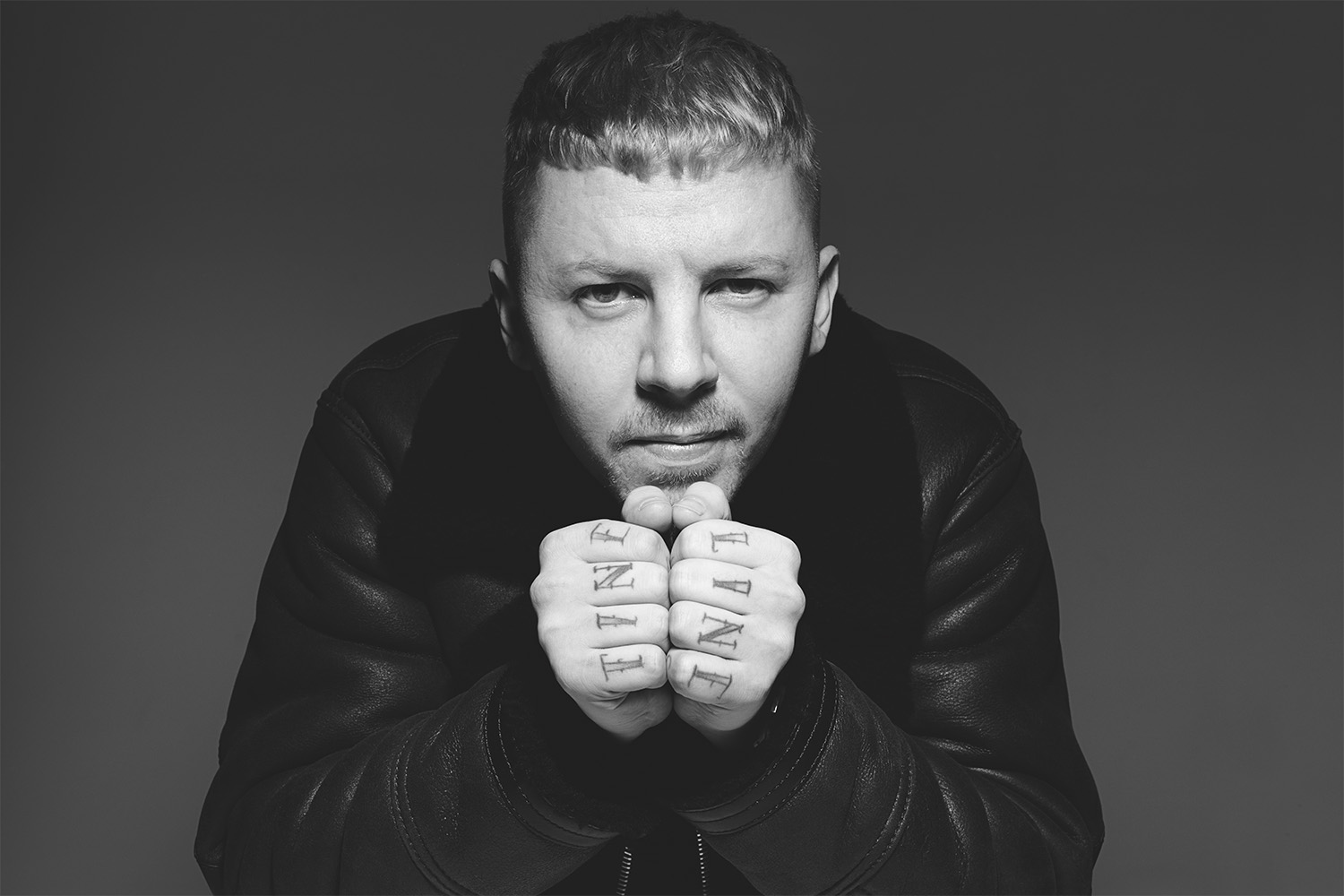
The Musician
Rapper, songwriter and mental-health campaigner Stephen Manderson is better known by his stage name, Professor Green. He was raised by his grandmother and great-grandmother on a council estate and lost his father to suicide when he was 24. He and his partner have a one-year-old son, Slimane.
What is it to be a man? As a kid, I found the whole thing really confusing. You spend your twenties trying to be all of these things – a man, an adult, a grown-up – and you think there’s a point in life when it just happens. But it’s a learning curve; a steep one, at times. Now, more than knowing what it is to be ‘a man’, I know what it is to be myself.
I think there are a lot of men who feel quite displaced at the moment, especially the older generations. Men’s place in the world is shifting, as is women’s. But women have fought so long for their position in society that men can feel a little bit behind, because we aren’t as honest about how we feel. We don’t have these big discussions with each other.
This is all a generational hangover, right? The stiff upper lip is a hangover from the war. And, yes, there will be times when you have to puff your chest out and be resilient. But when you come out the other side, you have to process it. Otherwise your trauma becomes your identity.
There’s no single trauma that’s fucked up my life, it’s all been accumulative. My dad taking his own life was traumatic. Getting stabbed was traumatic. But no single event caused my difficulties throughout the larger part of my life. All of my friends who’ve been in jail, who’ve been stabbed or have stabbed people, they’re all traumatised. Some of them are dealing with it. But some can’t speak about it because they’re still in an environment where it’s not safe to be vulnerable. There are a lot of people who are not given the chance to be gentle.
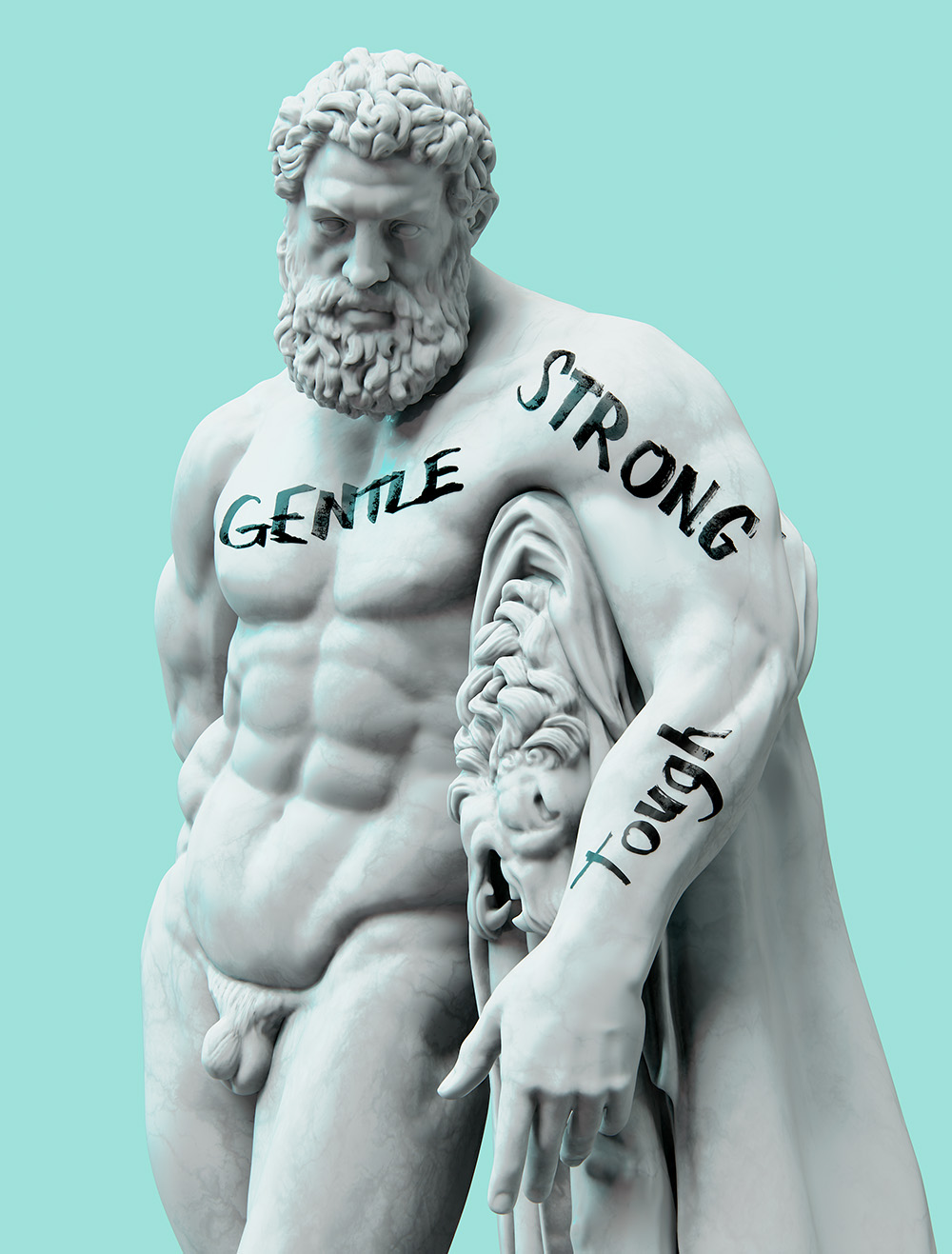
Pressures to appear invulnerable can feel at odds with our inner experiences. Artwork by Peter Crowther.
When men talk about emotions, there’s often no ‘s’ on the end, there’s just one emotion: anger, which is almost an adult fear. Because you don’t know how to express anything beyond that – or are scared to in case you’re deemed, what, effeminate? I don’t understand that. The women in my family were incredibly bloody strong. My nan worked three jobs a day.
My son turned one in March. I don’t ever want him to be afraid to tell me anything. I think a lot of people can fuck their children up by projecting on to them what they wanted to be. The only thing I want for my child is that he doesn’t experience the insecurity or the anxiety that I did.
There was a point in life when the purpose of having children would have been to correct my own upbringing. That wasn’t the reason that I had a child. Slimane was born purely out of love. He’s not a project, he’s my son.
I grew up in a house with four generations. I took on so much ancestral bullshit that I wasn’t even alive for. Things become hardwired at a young age, so your behaviour and actions are things you always have to be aware of. I had to do a lot of work on myself so that I didn’t pass [negative] traits on to my child. I think that’s every parent’s duty.
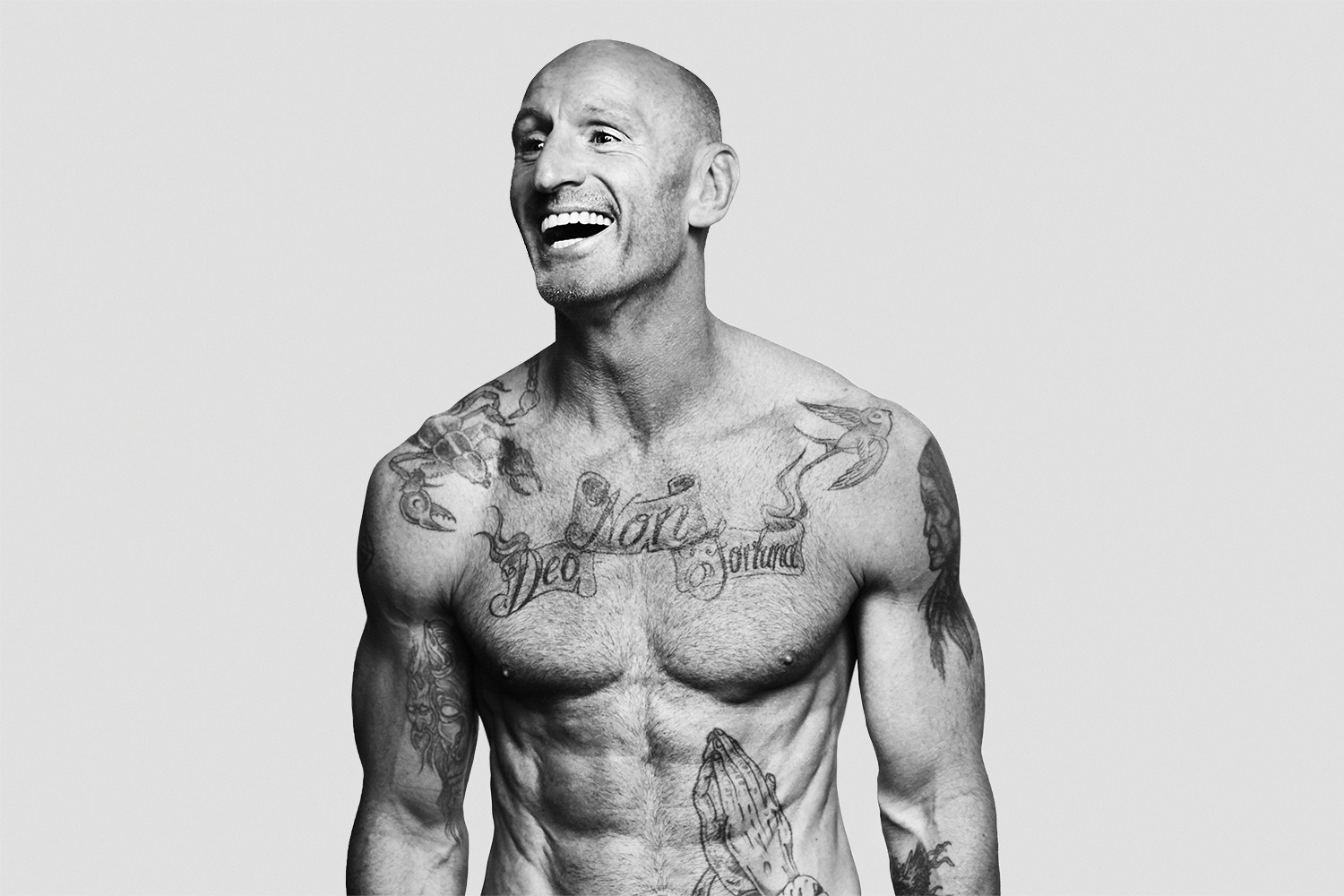
The Rugby Player
Former Wales and British Lions rugby union captain Gareth Thomas came out in 2009 while still playing and remains one of the few high-profile, openly gay sportsmen. Since retiring in 2011 and revealing in 2019 that he has HIV, he’s completed an Ironman to challenge perceptions.
I always followed what my older brothers did. They both played rugby, so I played rugby. Because they were physically more mature, they were always better than me. I used to get on their nerves because I was trying to nip at their heels. My eldest brother never held back. I learned how to take a beating.
My dad is someone who doesn’t say much, but when he speaks, people listen. If my mother said, “You wait until your father gets home”, we knew we were in trouble. When he’d give us pep talks before certain sporting events when we were 12 or 13, you’d hang on every word because it wasn’t often he spoke in that way.
You become 17, 18 and you go from playing against people the same age as you to people who are bigger. So I started lifting weights. It gave me this sense of wearing a suit of armour. But the reality is it’s a mask you wear to make yourself feel invincible when you’re hiding from people who are better, more skilful.
Because I couldn’t be authentic, I had to become what others thought I should be. And that was someone who wasn’t afraid to use his size and strength to defend his so-called masculinity by being aggressive in his social life. Because a masculine man – as I thought – doesn’t walk away, doesn’t decide to have a conversation instead.
I’m constantly having to call people out [for discrimination] because you get into this environment where there’s five or six men together and everyone’s trying to tell the best story, sometimes to the detriment of others. It’s easy to be the one to go along with it, to say nothing. You need to be the one who’s going to stand up. One of the greatest lessons I’ve learned is to not be a bystander.
When my husband and I were assaulted in Cardiff, I remember these young lads were kicking and punching me and I was on the floor thinking that if I punch back, because I’m a lot bigger and stronger, all of a sudden this has flipped to me potentially seriously hurting one of them. When I had the opportunity to speak to them, I realised that, through their upbringing, they had the justification that what they were doing was okay. I thought: if these guys get arrested, that’s going to justify the hate. That made us walk away feeling like we weren’t victims, and that they would learn
a positive message about the LGBT community.
I wish I could transfer who I am now to the Gareth Thomas of 20, 21, and play with this authenticity. I know there were moments when I made the wrong decision because I was worrying about what everyone else thought, rather than doing what felt right. I would love to know what I could’ve achieved. Being authentic gives you the chance to be the best version of you.
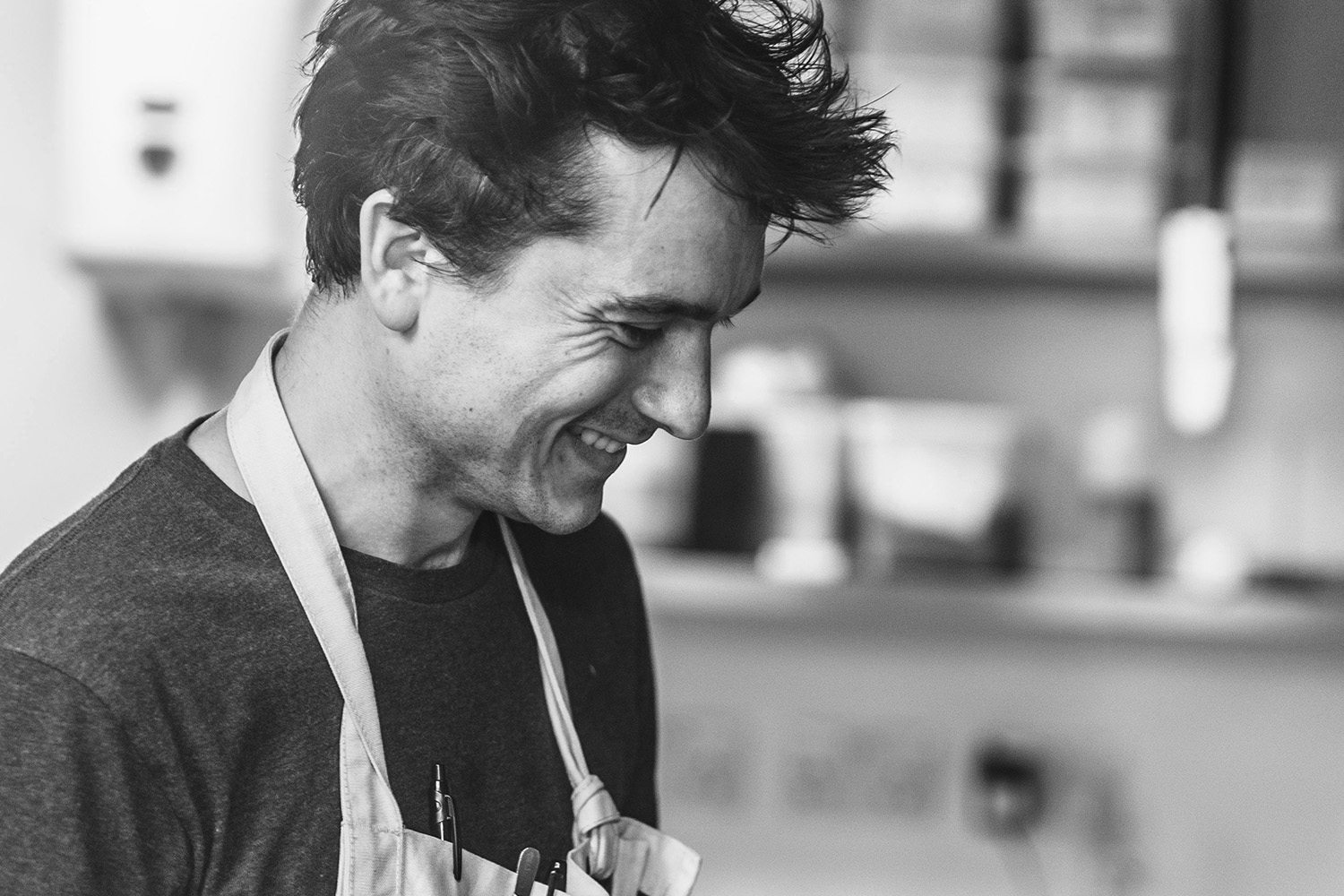
The Head Chef
Jackson Boxer is the acclaimed chef-patron behind lauded restaurants Brunswick House and Orasay. A precocious talent, he was renowned for his highly inventive food as much as his decadent lifestyle in his early career. Now clean and sober, the father of three has a renewed perspective on life.
My initial understanding of masculinity was created – and then rudely disrupted – when I was a young boy. At home, my mother didn’t just hold the family together, she provided for it. She was a successful artist – an incredibly confident, expressive and driven person. It was my mother who made most family decisions. My father, a writer at the time, was a strong character, but not demonstrative or prolific in the way my mother was. As a result, I didn’t grow up with any assumption of male dominance.
I was quite gentle, passive and self-involved. So when I reached secondary school, it was slightly traumatising to find that life wasn’t really like that. To find that social success depended on competitive dominance. All the things that I’d been raised to see as aspirational traits – conscientiousness, kindness, empathy – singled me out for humiliation and ridicule. I felt I had to unlearn these things, to toughen up.
The kitchen was a draw for many reasons. I loved the food, but it was also a place to win respect. I started work in restaurants with many points to prove: that I could be tough, that I could be independent. In the kitchen, if you work hard, if you listen and do as you’re told, you can become very useful very quickly. The sense of reward that came from being respected for my work was enormous.
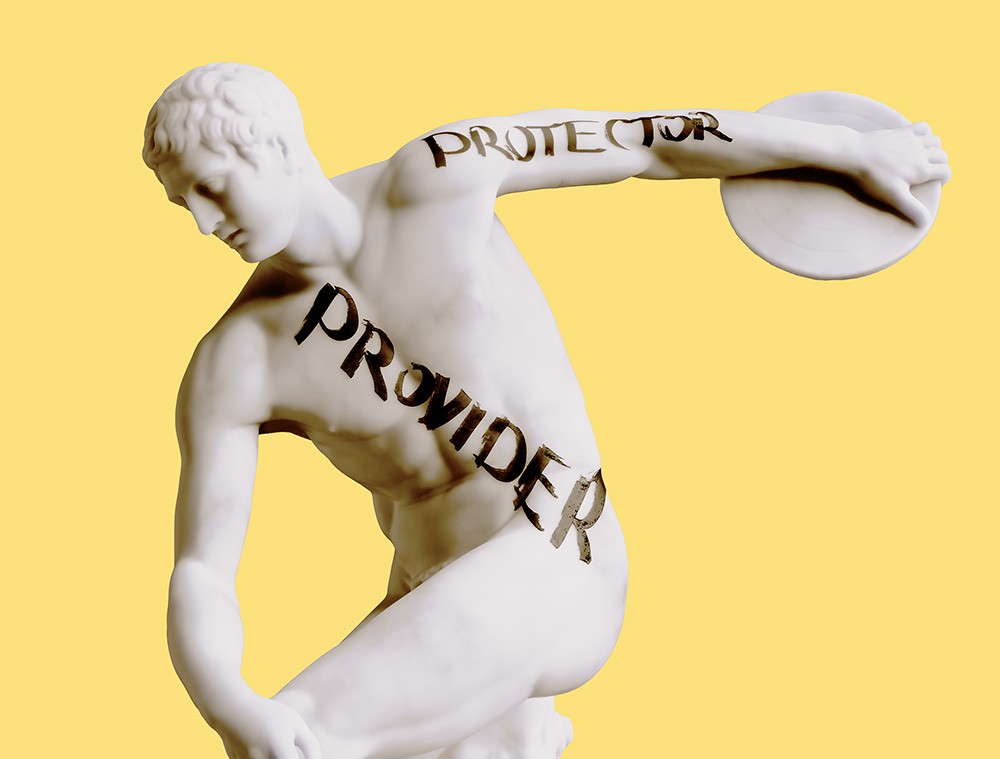
The ideas we learn in early life don’t dictate our later choices.
By the time I was 23, I had opened my own place. At that stage, I didn’t have a vision for the restaurant. I just had this anarchic predisposition towards figuring it out as I went along. The nice thing about being young is that no one expects you to be an authority. Later, as we became more successful, and I had multiple kitchens to look after, we had to professionalise.
I was under a lot of pressure, while also battling a huge sense of personal inferiority and feeling out of my depth. I suppose I’d set on an idea of masculinity that centred around self-reliance, but also a suppression of these insecurities. Unfortunately, I proceeded to watch as my addictions and compulsive behaviour destroyed it all.
For much of my twenties, I was using drugs and alcohol to get over this insecurity and shyness, yet behaving in a wildly extroverted, obnoxious way that was out of all proportionate compensation. Having since been through recovery and experienced Narcotics and Alcoholics Anonymous, I know there’s nothing that’s unique to men about that. But it’s true that men are statistically more reckless. My thirties have been a process of realisation – in order to re-evaluate my sense of self, I’ve had to deprive myself of easy hedonism.
There are many things I did when high in my twenties for which I feel deep remorse. You can’t just indulge pleasures wherever you see them. Especially when they stem from insecurity or become suffused with ideas of power and dominance. That’s when they become poisonous. To me,
that is related to an adolescent insecurity that is fundamentally unmasculine.
I don’t view masculinity on a spectrum with femininity – like two opposing ideas. I see it as being about immaturity versus maturity. An adult male isn’t the antithesis of an adult female, he’s the antithesis of an immature male.
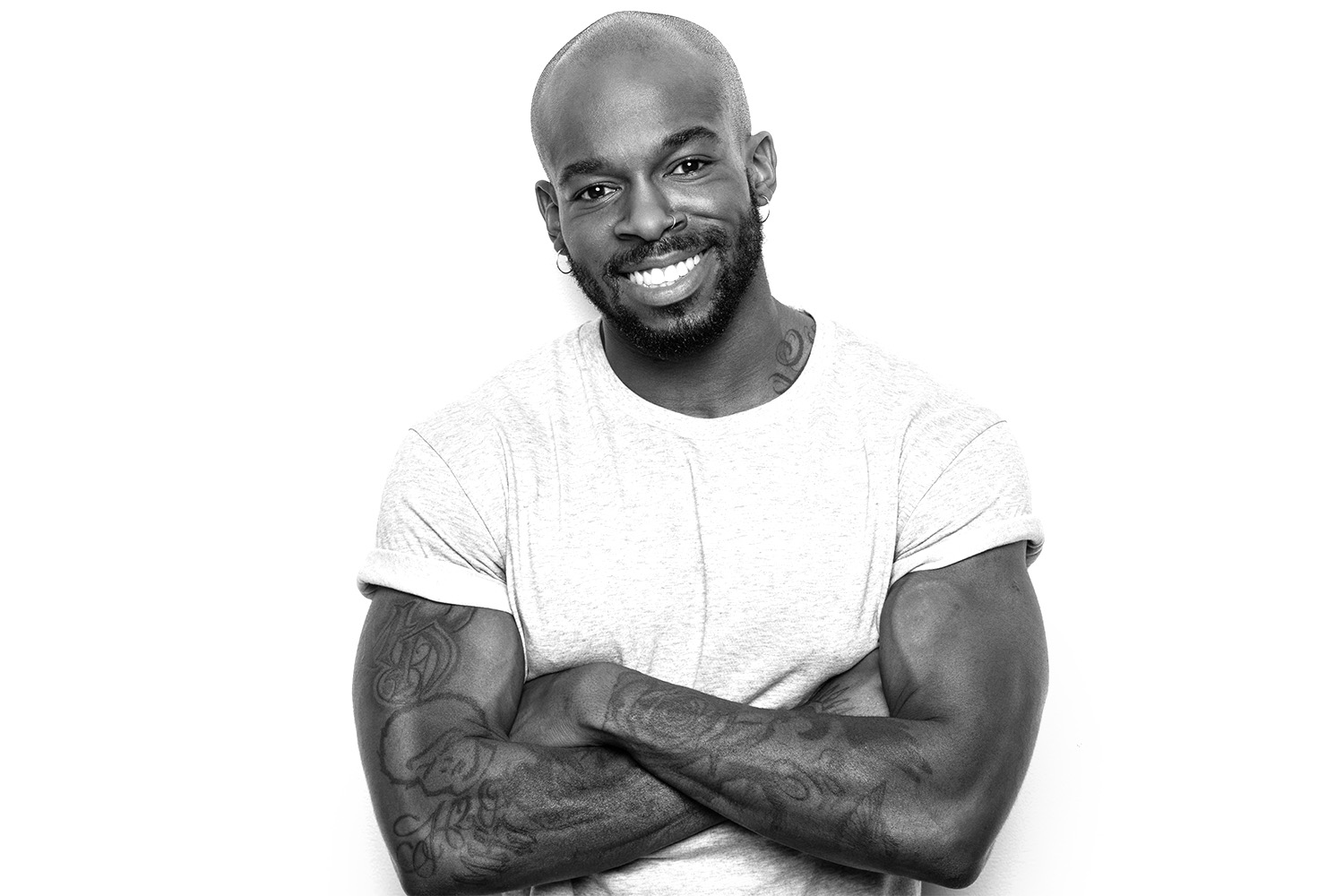
The Dancer
Theophilus O Bailey – stage name ‘Godson’ – is a dancer who currently appears in Magic Mike Live, the Channing Tatum-derived stage show based on the film about a troupe of male strippers. He’s also danced and choreographed for FKA Twigs, Fergie and Dua Lipa, among others
As part of my Magic Mike audition, there was an interview. They asked how I felt about women: “What do you think women want?” I said, “I think women want honesty and security”. Just straight down the middle, this is who I am and what I’m bringing to the table.
There are the traditional strippers – a fireman, a police officer, Tarzan, a cowboy. All of these men play significant roles in society and in stories when it comes to protecting, or directing a situation. I believe these characters provide a sense of security. I think the aesthetics can sometimes be secondary to that.
In the Magic Mike stage show, we examine these stereotypes. We ask, what does she really want from a man? The modern ‘ideal’ men presented in our show are also in positions of protection or direction – but this time it’s “a CEO who pays men and women equally”, “a vet”, “a PT who knows how to get you into shape”. The dynamic shifts to what’s seen as more important in today’s world.
Being on stage in Magic Mike feels good. I’m there to provide. To fulfil whatever fantasies the audience has. I need to be in a space where I’m willing to just give.
“My dad was always about providing. I apply that pressure to myself” – THEOPHILUS O BAILEY
I grew up in east London. I discovered dance when I was 14. I’d poke my nose in every now and then at lunchtime until I plucked up the courage to join the class. I went to a boys’ school, so dancing wasn’t popular. But I loved it. Boys being boys, they’d tease me. But I’m always going to do what makes me happy and not allow others to tell me what I should be doing with my life.
I used to be quite a chunky lad. Then I started focusing on what I was eating, how I was training. My dad bought me a pull-up bar when I was 16. I fell in love with fitness, as well as dance. Staying in shape comes naturally now. It’s the foundation of who I am. I train six days a week.
For me, it’s natural for men to take care of themselves. I look at my dad and brother. My dad always wore a suit. He has a range of suits and fragrances. My brother was pretty much the same – always fit, always in the gym.
My dad was always about providing. He came to this country from Nigeria and he wanted to make something of himself. I apply that pressure to myself. My values are to provide and protect.
I do believe that I have a feminine energy or quality, too. As a choreographer, I have to understand what makes a woman feel comfortable. That skill helps with the Magic Mike performance. You have to be able to read the audience. You have to ask, “Can I take your hand?” You need to know. My mum has always drilled it into me, how to treat a woman.
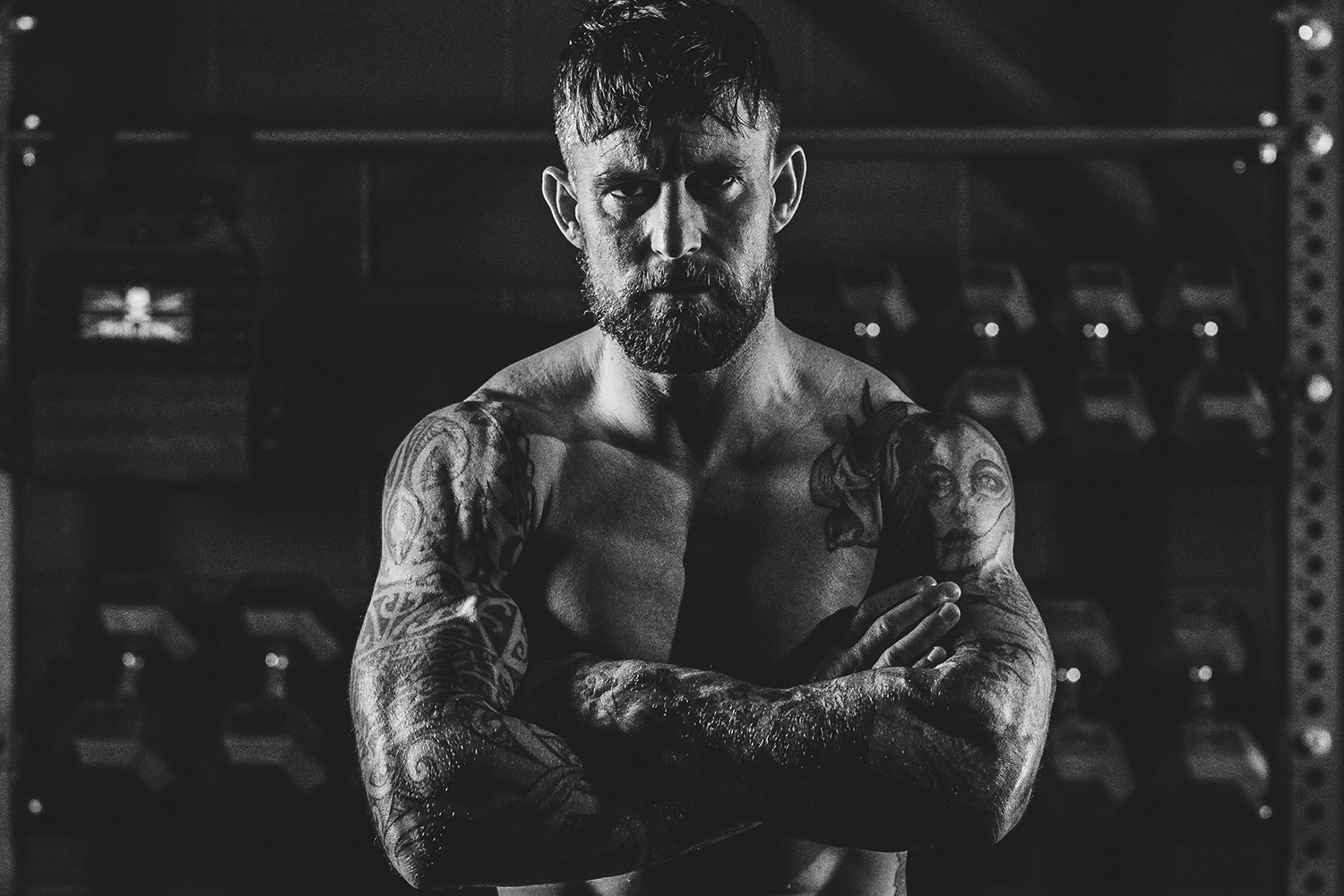
The Elite Soldier
Having called time on a potential football career due to injury, Anthony ‘Staz’ Stazicker joined the Royal Marines at 21. After 13 years’ service, including 10 in the elite Special Boat Service, and being awarded the Conspicuous Gallantry Cross for his actions in Afghanistan, he co-founded special forces-inspired clothing brand ThruDark.
My parents split up when I was seven and I moved from Wigan to Nottingham with my mum and stepfather. I had a difficult time adjusting and not many role models. When we weren’t fighting each other, I looked up to my brother. He was that protector growing up. Then I got heavily into football and the next in line were coaches and PE teachers. And then, losing my mum at 11, dealing with that – or not dealing with it… my grandparents moved down, so my brother and I moved into a bungalow with them.
My grandad never missed my football matches. He was there with me through thick and thin. And although there wasn’t so much love and affection, it was more that I knew he was there.
My mum passing away left me with a lot of questions. A lot of anger. My grandparents were a bit old school, so we didn’t really talk about things like that. At that time, I wanted to ignore it. Sport was an outlet for me: being super competitive, always wanting to win. Maybe I felt like I had something to prove.
“I was super competitive, always wanting to win. Maybe I felt like I had something to prove” – ANTHONY ‘STAZ’ STAZICKER
To run into a room and potentially lay down your life for your comrades… the military breeds a unique sense of togetherness and brotherhood. Because of the environment you’re in, a lot of stuff probably is tucked away, it’s not spoken about. Do you feel fear? Yeah, of course, but you’re operating, you’re acting, you’re reacting to a situation and dealing with it, doing what you’ve been trained to do.
Masculinity now is a choice, I think, that’s been afforded by the smokescreen of a temporary state of order. And that’s a good thing. For me, I think we still need ‘sheepdogs’. So I’m going to raise my boys to never be bullies, but to always look after yourselves and, more importantly, each other and your friends. I think you should improve yourself physically and mentally.
I think it’s about being honest with your kids, with yourself, about what the world is. Understanding that life’s hard. The longer you protect your children from that truth, the harder it’s going to be for them. Strength of character is a big thing that I’m going to drive into my kids. Old-school values that I think are good: integrity, loyalty, authenticity. I don’t think we should encourage weakness. I don’t think weak men are any use to anyone. But you can show vulnerability. We’re all vulnerable. It’s important to recognise those feelings and speak about them openly.
I detest the phrase ‘toxic masculinity’. Biologically, I believe men are wired to be more aggressive than women. I don’t think it should be shamed out of boys or men if you’re aggressive – if you’re a protector. In the same respect that it shouldn’t be shamed if men or boys aren’t that way inclined. We’re all different.
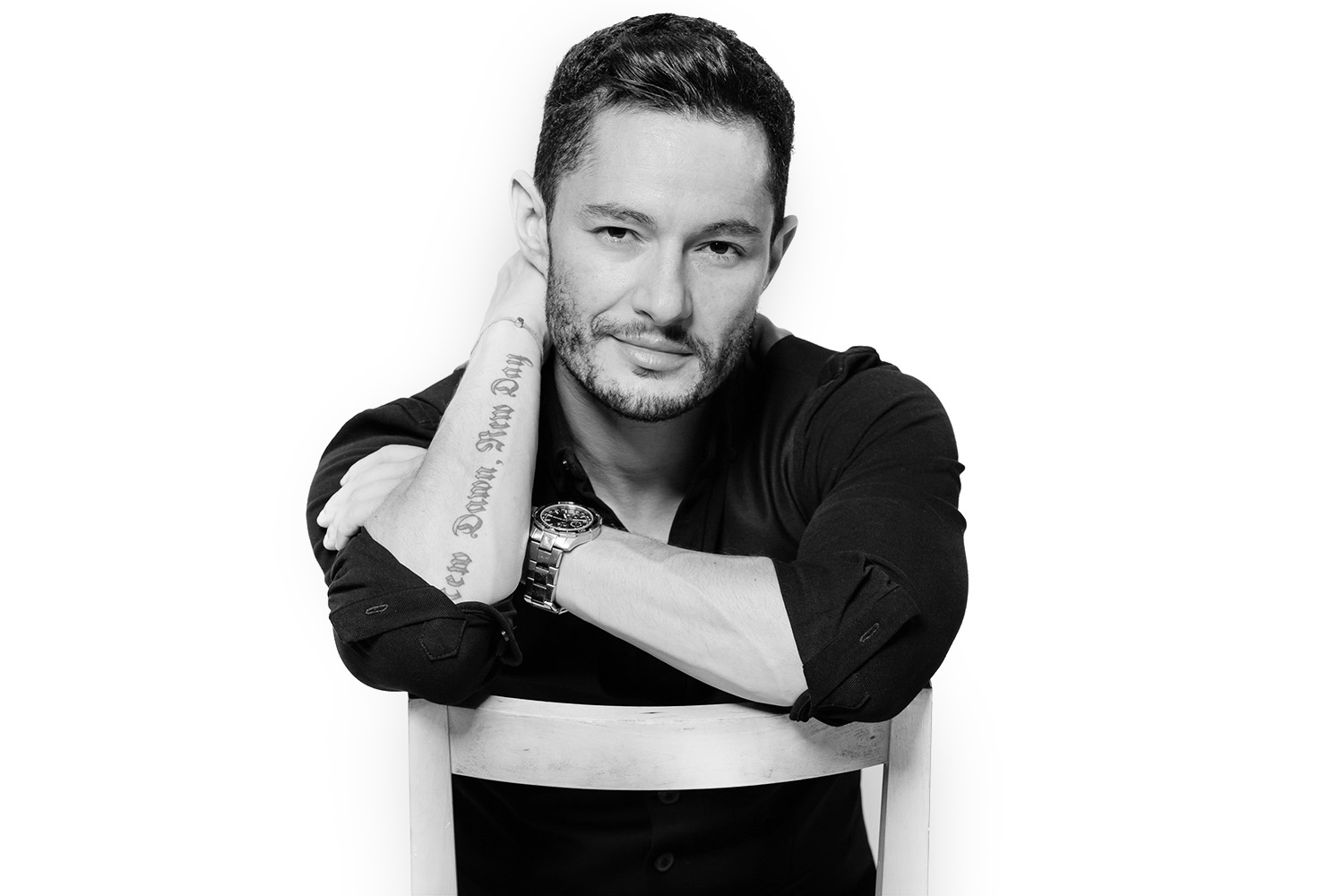
The Trans Rights Advocate
Jake Graf is an actor, writer, director and activist. Raised as a girl, he began his gender transition at the age of 28. Graf and his wife have a daughter, born in 2020 and delivered via surrogacy using his eggs and a second child on the way.
I had no choice but to live as a woman for the first 28 years of my life, but I was miserable and I knew it wasn’t right for me. That didn’t mean I longed to be tougher, less communicative or emotional or any of those things associated with the traditional view of masculinity. All I can say is that I knew, from age two or three, that I was male.
I didn’t fit with the girls and gravitated towards the boys. I didn’t want to wear skirts. I didn’t want to be called ‘she’. I didn’t want to be called my birth name. But I was conditioned as female.
I was raised as a girl in the 1980s under Margaret Thatcher’s reprehensible Section 28, so trans and gay issues couldn’t legally be talked about in schools. It was very much: put on a pretty dress; pass round the crisps at the party; give your uncle a kiss. My wife is also trans and we talk about the ways that we were brought up. Hannah was brought up to be outspoken, to be heard and seen. I was brought up to be quiet and know my place.
On the flip side, I can talk about my emotions, I can talk about how I’m feeling and make myself vulnerable, which Hannah finds much, much harder to do.
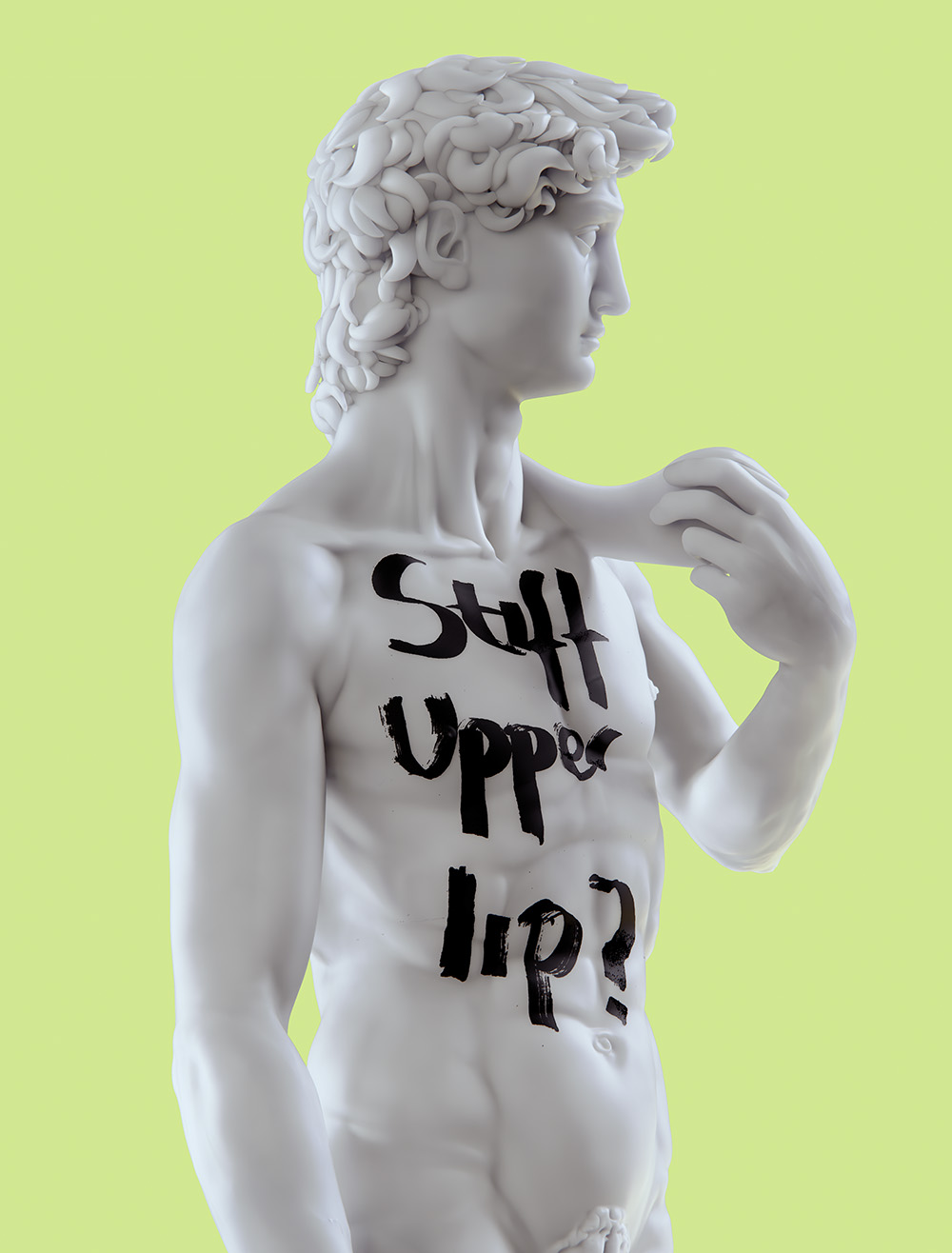
Hold on to ideas that help you and question those that don’t.
When I eventually came out and transitioned, I could walk down the street and no one would ever know that I was trans. That is a luxury a lot of trans men have because testosterone is a powerful hormone. It’s certainly a luxury that a lot of trans women don’t have because, again, testosterone is so powerful. My wife has a deep voice, she’s broader. Trans women find themselves attacked because it challenges people’s fragile masculinity. Whereas trans men, we kind of pass through the world unseen.
When I started testosterone, people said, “You’re going to feel aggressive, you’ll feel angry”. But I’d been angry and aggressive all my life. It actually filled me with a sense of calm because I knew I was becoming who I’d always known myself to be. Two surprising effects were that the sex drive rocketed and I found it was harder to cry with testosterone coursing through my veins.
A lot of trans people, when they transition, go hyper- masculine or hyper-feminine. Trans women might wear heels and nails, go super glam. I started holding doors for women and pulling out chairs. Older women would thank me, but younger women hated the perceived sexism of it.
People often ask me what I think it means to be a man. But everything I say – being strong, being stoic, being a caregiver – women are all those things, too. It’s not that I think the genders are blurring, because I’m very binary and I fought hard to be recognised as a binary man. But I think it’s harder to define what that is.
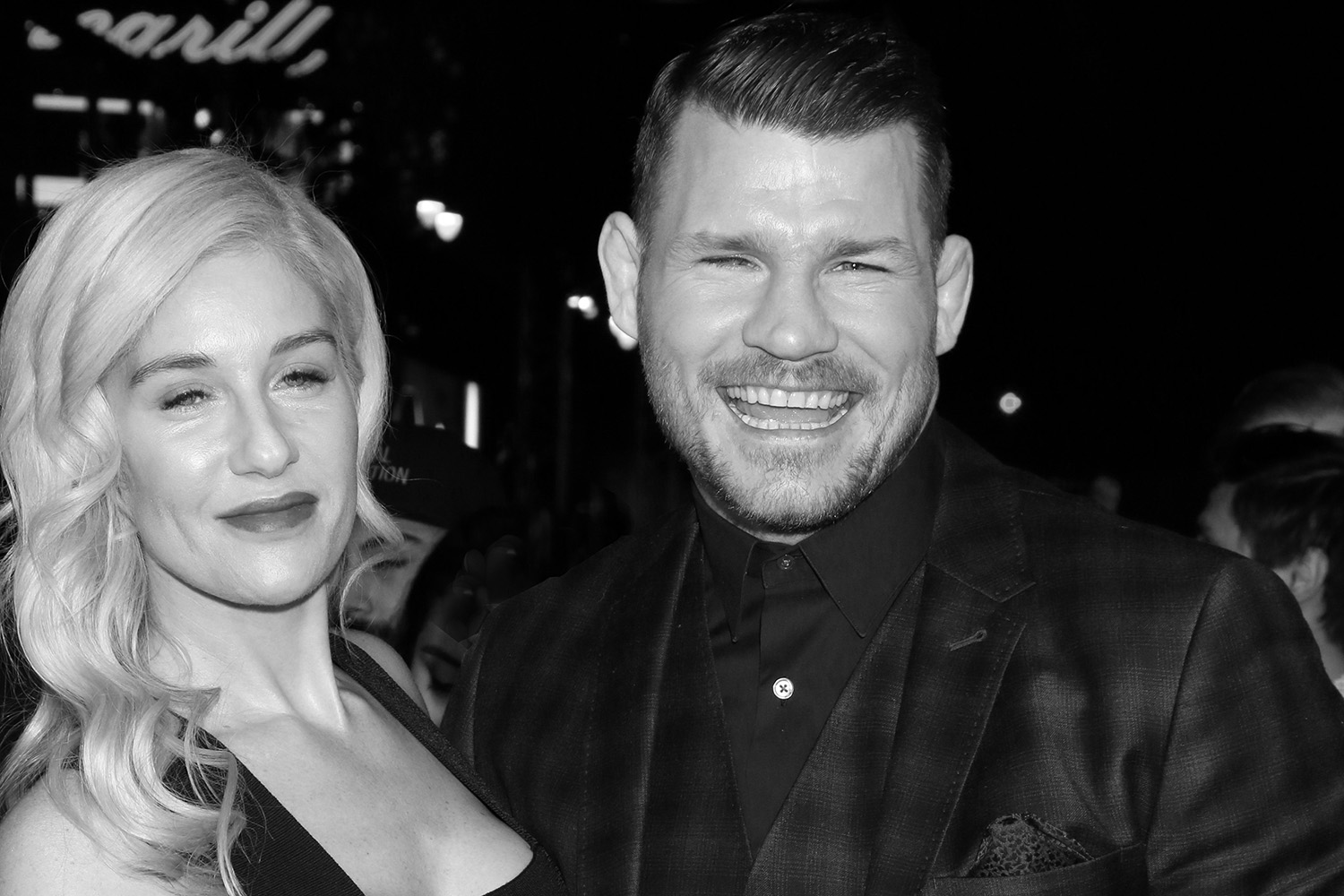
The UFC Fighter
Michael Bisping is a retired mixed martial artist who became the Ultimate Fighting Championship Middleweight Champion in 2016, beating Luke Rockhold despite only having sight in one eye. He’s also appeared in Hollywood movies and has three children with his wife Rebecca.
I grew up in a volatile household. Every day it was arguing, shouting and – whether it was my brothers, my dad, my mum – I got a clip every day. So, when I was confronted with situations, it didn’t seem unnatural to fix those with my fists. I was never a troublemaker, but nor would I back down from trouble. I got in a lot of scraps. And when I was younger, that feeling of imposing your will over another man in a fight, that was the best feeling in the world.
When I found martial arts, it gave me some direction because I found something I was good at. I got confidence, I gained recognition. My father put my results in the local newspaper. Everyone knows about the benefits of martial arts for kids: it gives you discipline and teaches you about respect.
I guess I’m old school. I was a tough guy. But that’s not what makes you a man. It’s doing the right thing. Not shirking your responsibilities. Being a man of your word. Providing for your family. Addressing any shortcomings. It’s not about being a tough guy or a world champion.
I remember fighting in Glasgow against Thales Leites and my son was in my corner. And before you step into the Octagon, you have a moment with your team: a hug, a chat, a high-five. My son gave me a big hug and I almost cried my eyes out.
Next fight, he asked if he could be in my corner again and I had to tell him, “I’d love you to be, but I got too emotional last time. I can’t go into a cage to fight another man crying my eyes out.”
Fighting is obviously a very physical sport. It seems animalistic and feral, but the mind controls everything. You can’t be acting out of emotion. Whatever you do in life, if you’re angry, you’re never the best version of yourself. And I was – I was an angry man. I fought on instinct and physicality.
When I fought for the belt, I took the fight on two weeks’ notice. Incredible pressure. And when things weren’t going my way in training, I’d lose my temper. My coach said to me, “This is the pinnacle of a lifetime of hard work. How about we enjoy the process?” He was right. Why was I letting the aggression and pressure build up? As soon as I saw it from that perspective, everything changed. I had more success in training, in fights, in life, and I became world champion.
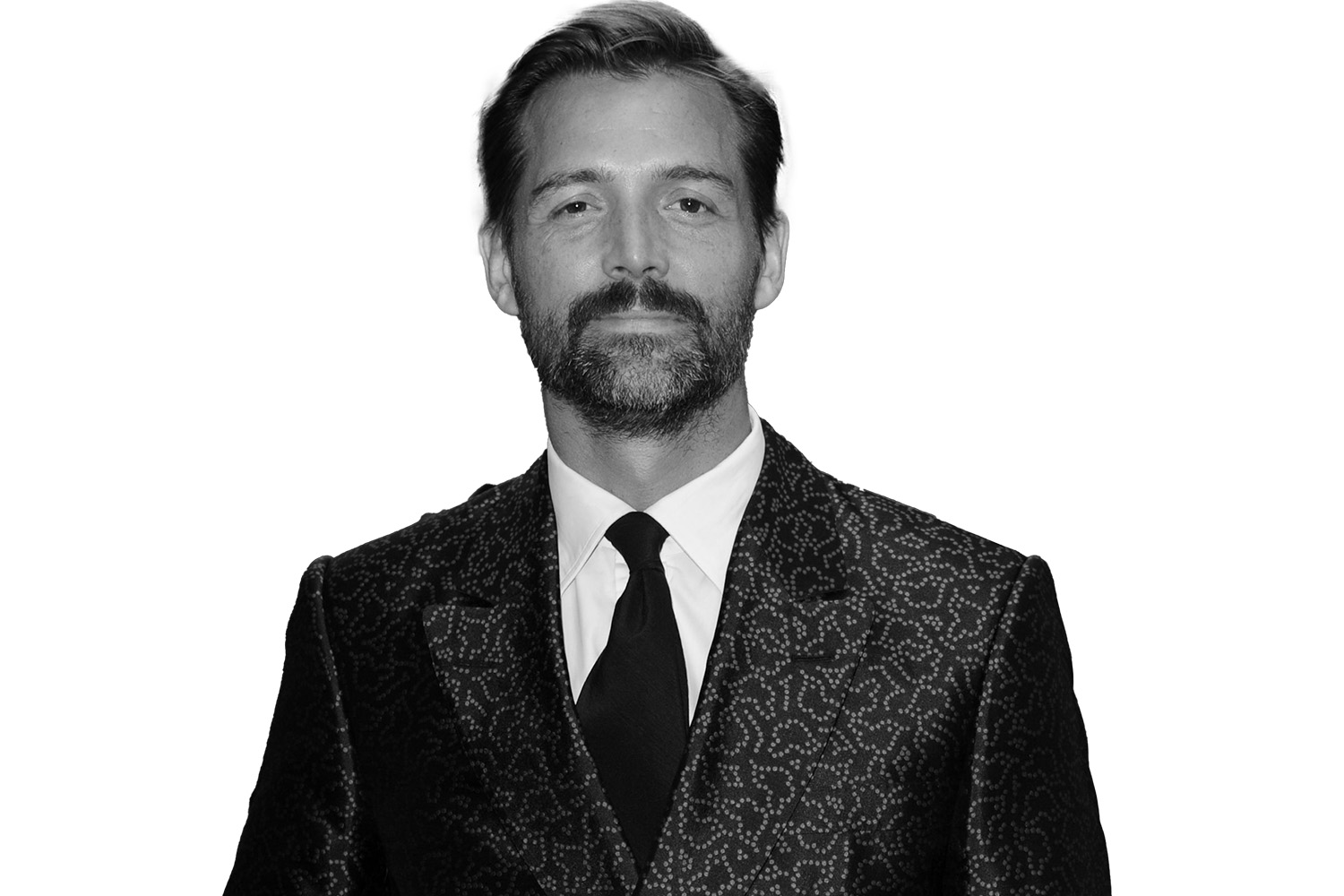
The Fashion Designer
Award-winning designer Patrick Grant was working in engineering when he saw Savile Row tailor Norton & Sons was for sale. He’s since revived subsidiary E. Tautz & Sons as a ready-to-wear brand, founded ethical label Community Clothing and bought clothing manufacturer Cookson & Clegg.
I can’t remember a time when I wasn’t into clothes. I recall as a five-year-old being really into making sure that my school uniform always looked immaculate.
Growing up, I read fashion magazines. I’ve got pictures of my room at [boarding] school and it’s all pictures from Vogue; my roommate’s wall was covered with Bon Jovi and shit like that. I didn’t even think for a second that wasn’t normal. Vogue and Elle both had men’s sections, like, once a quarter. I remember being a kid in Edinburgh, wandering around in a Panama hat with a Liberty scarf tied round it. My best friend wouldn’t walk next to me. I was big and played rugby. It was an odd combination. I’m sure I got the piss taken out of me slightly. But I simply thought, “Well, I just look better than you lot”.
When I lived in San Francisco, about 25 years ago, I remember wearing a skirt quite often – well, it was a sarong. David Beckham did it about five years later. I thought like, “Was he watching?”
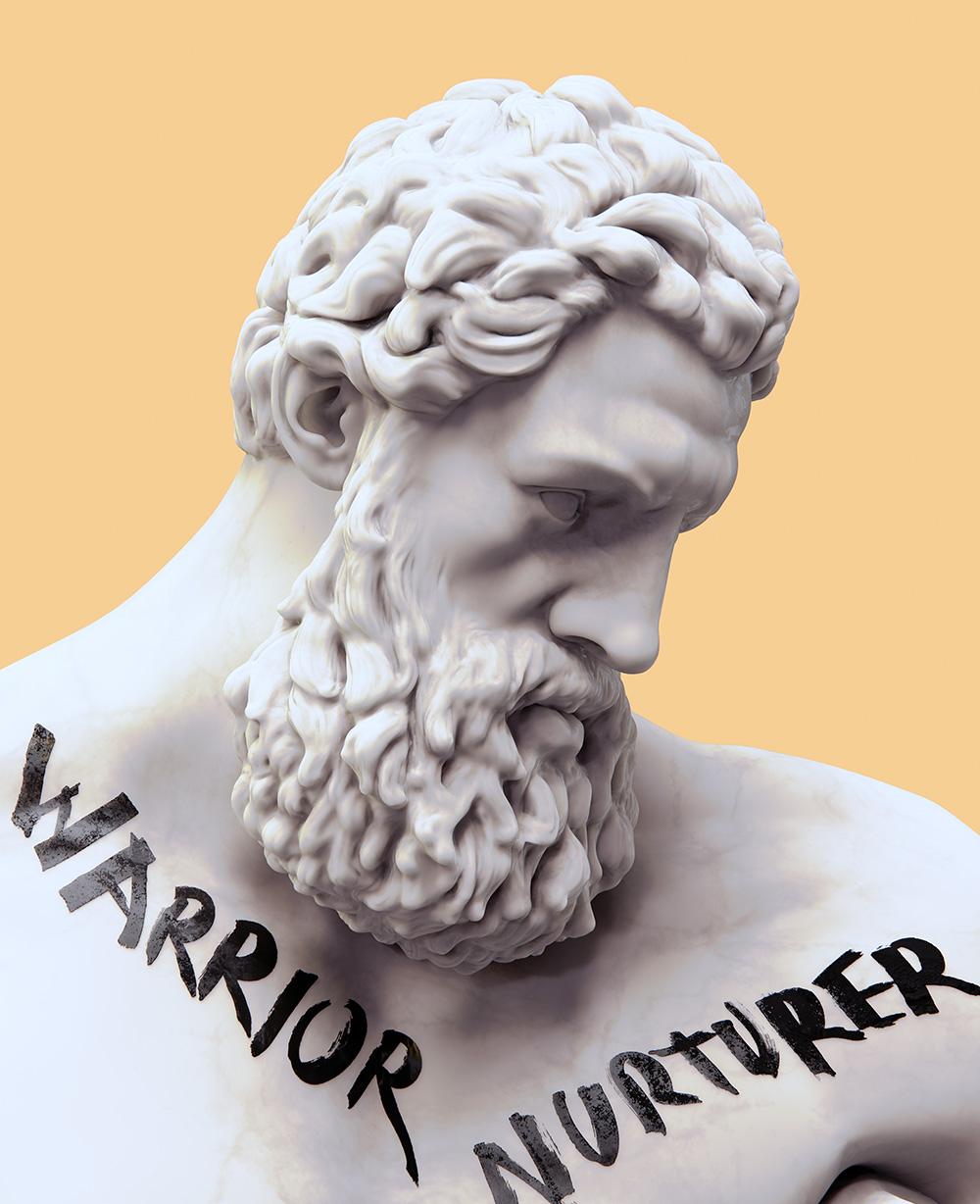
Don’t allow conflicting expectations to steer you off course.
I was lucky enough to grow up with my dad and he was in some ways a good role model. He worked hard. He was my rugby coach, actually. He also took great care over his appearance. He took care of his clothes. I remember very vividly the rhythm with which he polished his shoes. He’d been a nightclub promoter and manager of a rock band that went on to become Marmalade. Later, he became an accountant.
The only grandad I knew had been a yarn designer for a firm in Galashiels [on the Scottish Borders]. When I was growing up, he was in charge of bringing in investment to replace all the jobs lost when the textile industry collapsed.
Having spent time with him, I saw the effects of the decline of the textiles industry first-hand. You see the unravelling of the social fabric. When I started at Norton’s, we made a conscious decision to support British textile manufacturers.
Thinking about the question of masculinity and what it means to be a man, more generally, I think about what it means to be a good human and what I want to do with my time on Earth. I’ve probably had half of it now, and I’ve been working for 25 years. I’ve started to think very carefully about how I use the remaining 25 years of working life and what I want to achieve. What you do in life is much more important to your overall happiness than what you own. That’s why I want to build a lasting legacy.
“I guess I’m old school. I was a tough guy. But that’s not what makes you a man” – MICHAEL BISPING















